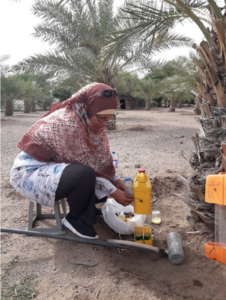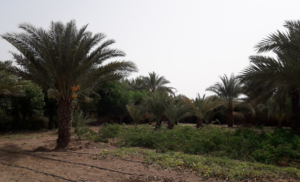Adwa ABDOU ALI’s thesis has just been formally accepted by the university! Her research, culminating in her thesis titled Insects of the date palm in traditional and modern orchards of Djibouti, compared the abundance of several potential insect pests of date palms in modern, monocultural orchards, and in older, traditional, and polycultural orchards, the kind one might find growing around oases. Both orchard types harbored potential pests, but the modern ones had more pests specialist of date palm, whereas the traditional orchards had a greater abundance of generalist pests.


Here’s the abstract:
In recent years, food insecurity and poverty, especially among the rural populations of Djibouti, have been increasing due to population growth and rising world food prices.
As a result, the government of Djibouti seeks to develop sustainable agriculture through date farming. The cultivation of date palms adapts well to the difficult pedoclimatic conditions of the Republic of Djibouti. Massive introductions of date palm have taken place in recent years to restore the older traditional palm groves (polycultures) and to create and/or extend new palm groves oriented towards monoculture.
However, the country faces major phytosanitary challenges: poor infrastructure, insufficient knowledge and a lack of research on the pests of this crop.
With the ultimate aim of protecting and increasing Djibouti’s date yields, this present work seeks to assess the susceptibility of palm groves to insect pests. To achieve this objective, a comparison of the insect fauna of the two types of palm groves was carried out using composite traps placed within the crown of the date palm. The experiment was carried out from 20 June to 2 September 2018, in six orchards on three sites.
The samples documented the existence and diversity of insects in these palm groves, as well as the presence and abundance of specialist date palm pests in monocultural palm groves. Natural enemies were also particularly abundant in the traditional palm groves, but species-level diversity did not show any correlations with type of palm grove.
This study contributes to the knowledge of insect diversity and potential pest species in the palm groves of Djibouti. These pests can have an important impact on date yields depending on the type of palm grove and this study thus underlines the needs to develop adequate means of pest control.
Congratulations Adwa!